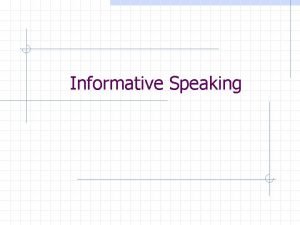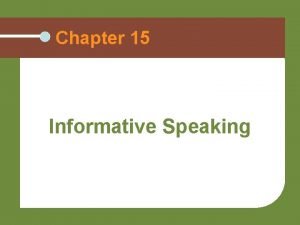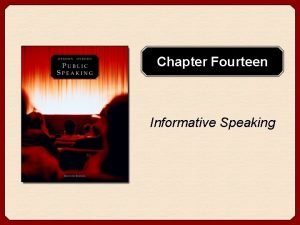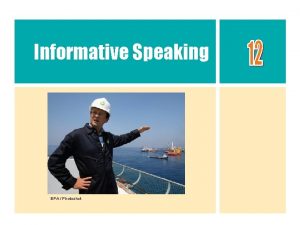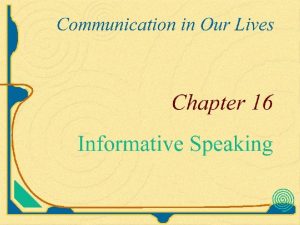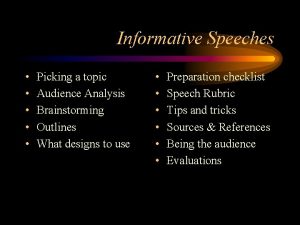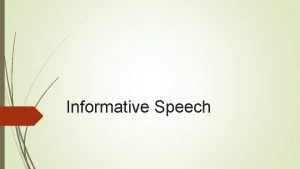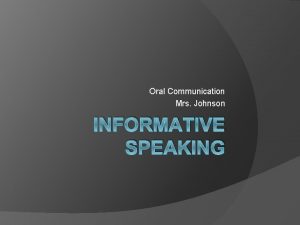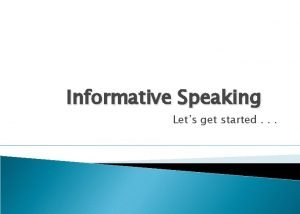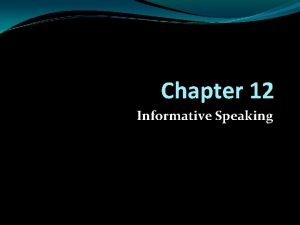The Informative Speech Purposes of Informative Speaking Informative









- Slides: 9

The Informative Speech

Purposes of Informative Speaking Informative speaking offers you an opportunity to practice your researching, writing, organizing, and speaking skills. You will learn how to discover and present information clearly. n If you take the time to thoroughly research and understand your topic, to create a clearly organized speech, and to practice an enthusiastic, dynamic style of delivery, you can be an effective "teacher" during your informative speech. n

Purpose n The purpose of the informative speech is to provide interesting, useful, and unique information to your audience.

Four major types of informative speeches: Objects: Speeches about objects focus on things existing in the world. Objects include, among other things, people, places, animals, or products. n Processes: patterns of action. One type of speech about processes, the demonstration speech, teaches people "how-to" perform a process. More frequently, however, you will use process speeches to explain a process in broader terms. n

n Events: focus on things that happened, are happening, or will happen. – n **remember to relate the topic to your audience. Concepts: focus on beliefs, ideas, and theories. – – – more abstract. be clear and understandable when creating and presenting a speech about a concept. **remember that this is distinct from a persuasive speech**. Focus your efforts toward providing unbiased information and refrain from making arguments.

n These categories provide an effective method of organizing and evaluating informative speeches. n Because you are speaking under time constraints, you cannot discuss any topic in its entirety. Instead, limit your speech to a focused discussion of some aspect of your topic.

Framing a Thesis Statement n Once you settle on a topic, you need to frame a thesis statement. – allows you to narrow your topic, and focus your research in this specific area, saving you time and trouble in the process. n Focus on a specific aspect of your topic and phrase thesis statement in one clear, concise, complete sentence, focusing on the audience. This sentence sets a goal for the speech.

Sample Thesis n A speech about art: n "The purpose of this speech is to inform my audience about the early works of Vincent van Gogh. “ n This statement establishes that the speech will inform the audience about the early works of one great artist. The thesis statement is worded conversationally and included in the delivery of the speech.

Outlining an Informative Speech n Use an outline! n Pretend that you are writing a paper, if that helps n Decide upon 2 -4 main points that will support your point – Use sub-points too n Consider “spice points” (where can you make the speech more interesting/engaging? ) – Ex. anecdotes, fun facts, visual aid n Remember to end as strongly as you open
 Informative speech vs persuasive speech
Informative speech vs persuasive speech Informative vs persuasive
Informative vs persuasive The goal of informative speaking is
The goal of informative speaking is What is the essence of informative speaking
What is the essence of informative speaking Uil extemp topics
Uil extemp topics Characteristics of effective informative speaking
Characteristics of effective informative speaking Informative speech characteristics
Informative speech characteristics Specific purpose statement for an informative speech
Specific purpose statement for an informative speech Audience analysis for informative speech
Audience analysis for informative speech Informative speech about phobias
Informative speech about phobias

